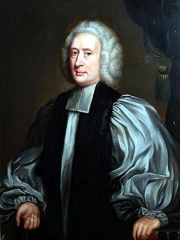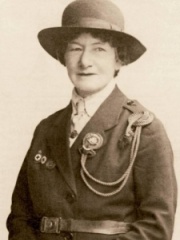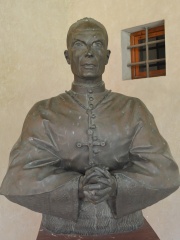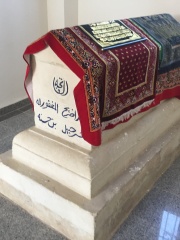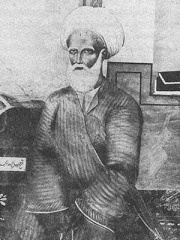RELIGIOUS FIGURE
Abu Dujana

 Abu Dujana
Abu Dujana
Abū Dujānā Simāk bin Kharasha (Arabic: أبو دُجانة سماك بن خرشة) was a companion of Muhammad and a skilled swordsman who is mentioned in Hadith narrations from the six major Hadith collections of Sunni Islam. Read more on Wikipedia
His biography is available in 20 different languages on Wikipedia. Abu Dujana is the 2,056th most popular religious figure (down from 1,502nd in 2024), the 192nd most popular biography from Saudi Arabia (down from 183rd in 2019) and the 78th most popular Saudi Arabian Religious Figure.
Memorability Metrics
Page views of Abu Dujana by language
Among RELIGIOUS FIGURES
Among religious figures, Abu Dujana ranks 2,056 out of 3,187. Before him are Guido Marini, James of Portugal, Peter Doi, Saint Telemachus, Joseph Butler, and Audomar. After him are Filipe Neri Ferrão, Agnes Baden-Powell, Elia Dalla Costa, Alfred Delp, Aulus Licinius Archias, and Frang Bardhi.
Most Popular Religious Figures in Wikipedia
Go to all RankingsGuido Marini
1965 - Present
HPI: 60.46
Rank: 2,050
James of Portugal
1433 - 1459
HPI: 60.45
Rank: 2,051
Peter Doi
1892 - 1970
HPI: 60.45
Rank: 2,052
Saint Telemachus
301 - 404
HPI: 60.44
Rank: 2,053
Joseph Butler
1692 - 1752
HPI: 60.44
Rank: 2,054
Audomar
600 - 670
HPI: 60.44
Rank: 2,055
Abu Dujana
HPI: 60.44
Rank: 2,056
Filipe Neri Ferrão
1953 - Present
HPI: 60.42
Rank: 2,057
Agnes Baden-Powell
1858 - 1945
HPI: 60.42
Rank: 2,058
Elia Dalla Costa
1872 - 1961
HPI: 60.42
Rank: 2,059
Alfred Delp
1907 - 1945
HPI: 60.41
Rank: 2,060
Aulus Licinius Archias
121 BC - 61 BC
HPI: 60.41
Rank: 2,061
Frang Bardhi
1606 - 1643
HPI: 60.41
Rank: 2,062
In Saudi Arabia
Among people born in Saudi Arabia, Abu Dujana ranks 192 out of 354. Before him are Saad Hariri (1970), Shurahbil ibn Hasana (583), Fadl ibn Abbas (614), Aliya bint Ali (1911), Saud bin Faisal bin Abdulaziz Al Saud (1940), and Aban ibn Uthman (641). After him are Al-Hurr ibn Abd al-Rahman al-Thaqafi (700), Saeed Al-Owairan (1967), Al-A'sha (570), Abdulaziz bin Muhammad Al Saud (1721), Uthman ibn Maz'un (null), and Ka'b ibn Zuhayr (700).
Others born in Saudi Arabia
Go to all RankingsSaad Hariri
POLITICIAN
1970 - Present
HPI: 61.12
Rank: 186
Shurahbil ibn Hasana
MILITARY PERSONNEL
583 - 639
HPI: 61.11
Rank: 187
Fadl ibn Abbas
RELIGIOUS FIGURE
614 - 639
HPI: 61.01
Rank: 188
Aliya bint Ali
NOBLEMAN
1911 - 1950
HPI: 60.97
Rank: 189
Saud bin Faisal bin Abdulaziz Al Saud
POLITICIAN
1940 - 2015
HPI: 60.89
Rank: 190
Aban ibn Uthman
HISTORIAN
641 - 723
HPI: 60.82
Rank: 191
Abu Dujana
RELIGIOUS FIGURE
HPI: 60.44
Rank: 192
Al-Hurr ibn Abd al-Rahman al-Thaqafi
POLITICIAN
700 - 800
HPI: 60.41
Rank: 193
Saeed Al-Owairan
SOCCER PLAYER
1967 - Present
HPI: 60.29
Rank: 194
Al-A'sha
WRITER
570 - 629
HPI: 60.17
Rank: 195
Abdulaziz bin Muhammad Al Saud
POLITICIAN
1721 - 1803
HPI: 59.87
Rank: 196
Uthman ibn Maz'un
RELIGIOUS FIGURE
HPI: 59.68
Rank: 197
Ka'b ibn Zuhayr
WRITER
700 - 662
HPI: 59.64
Rank: 198
Among RELIGIOUS FIGURES In Saudi Arabia
Among religious figures born in Saudi Arabia, Abu Dujana ranks 78. Before him are Aqil ibn Abi Talib (590), Shaykh Ahmad (1753), Asma bint Umais (null), Lubaba bint al-Harith (593), Saleh Al-Fawzan (1933), and Fadl ibn Abbas (614). After him are Uthman ibn Maz'un (null), Umamah bint Zainab (null), Al-Bara' ibn Azib (600), Sharif Ali (1450), Nafiʽ al-Madani (689), and Utba ibn Ghazwan (581).
Aqil ibn Abi Talib
590 - 670
HPI: 63.02
Rank: 72
Shaykh Ahmad
1753 - 1826
HPI: 62.83
Rank: 73
Asma bint Umais
HPI: 62.21
Rank: 74
Lubaba bint al-Harith
593 - 655
HPI: 62.18
Rank: 75
Saleh Al-Fawzan
1933 - Present
HPI: 61.47
Rank: 76
Fadl ibn Abbas
614 - 639
HPI: 61.01
Rank: 77
Abu Dujana
HPI: 60.44
Rank: 78
Uthman ibn Maz'un
HPI: 59.68
Rank: 79
Umamah bint Zainab
HPI: 59.56
Rank: 80
Al-Bara' ibn Azib
600 - 690
HPI: 59.42
Rank: 81
Sharif Ali
1450 - 1432
HPI: 58.85
Rank: 82
Nafiʽ al-Madani
689 - 785
HPI: 58.42
Rank: 83
Utba ibn Ghazwan
581 - 639
HPI: 57.79
Rank: 84




